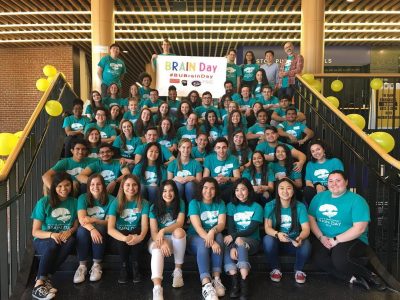A group of kids gather around a tank and watch as a cockroach’s leg gets cut off inside. They scream, “he’s gonna die!” But once the leg is attached to electrodes and stimulated with the low frequency signals of music, they become astounded at the way the leg starts to move to the beat of the song.

They then learn from Boston University students that the muscles can contract when the neuron that runs down cockroaches’ legs is activated by electricity.
Events like this are typical for the BU’s Mind & Brain Society, a group which was founded in 2008 and, “aims to create a network for undergraduate students who wish to take an active role in current issues and research,” according to BU’s website.
Throughout the past week, members of MBS have set up stations at Boston Green Academy, a public charter school in Brighton, to teach interactive lessons related to neuroscience in a program called “Piece of Mind.”
Emme Enojado, a junior in the College of Arts and Sciences and vice president of MBS, said another interactive station at the Piece of Mind event gave students the opportunity to touch a real sheep’s brain to identify its different parts.
“They’re all really interactive stations,” Enojado said, “which definitely helps with the learning process and gets the kids into it.
MBS welcomes students of all majors with an interest in the field and a passion to spread knowledge, Enojado said.
In addition to Piece of Mind, MBS offers a number of outreach programs to get underprivileged communities in Boston involved in and excited about STEM disciplines, especially cognitive sciences.
Their biggest event, according to the organization’s website, is Brain Day, a neuroscience fair sponsored by the Dana Foundation as part of their annual Brain Awareness Week. Stephanie Gonzalez, a junior in CAS and the president of MBS, said Brain Day is essentially a larger Piece of Mind.
The free event welcomes between 100 and 200 people from the local community each year, Gonzalez said, especially young families.
“They come in and they explore everything and the kids get super excited about the physiology,” Gonzalez said. “It’s for all ages, all backgrounds and it’s the best time of the year for me.”
In order to reach young girls specifically, Gonzalez said MBS is participating in the American Heart Association’s “STEM Goes Red” event which will take place at the University of Massachusetts Boston on Nov. 19.
“It’s basically to encourage girls to see what’s available to them in the STEM fields,” Gonzalez said. “Particularly middle school girls, and from underprivileged communities as well to give them access to that kind of information, give them access to all the resources that they need to get involved and passionate about the brain.”
In addition to their outreach programs and multidisciplinary approach, MBS also provides networking and mentorship opportunities to prepare undergraduate students for a variety of future fields.
MBS will host a Neuroscience Networking Symposium at the Rajen Kilachand Center for Integrated Life Sciences and Engineering on Dec. 3.
Izabella Gyurcsan, a freshman in CAS and a member in MBS, wrote in an email that her favorite part of MBS is their mentorship program, Synaptic Connection, where she said each freshman and sophomore is assigned an upperclassman mentor to meet with each month.
“It has been a great opportunity for me to learn more about the neuroscience program here at Boston University,” Gyurcsan wrote. “As well as to make new friends.”


























































































































